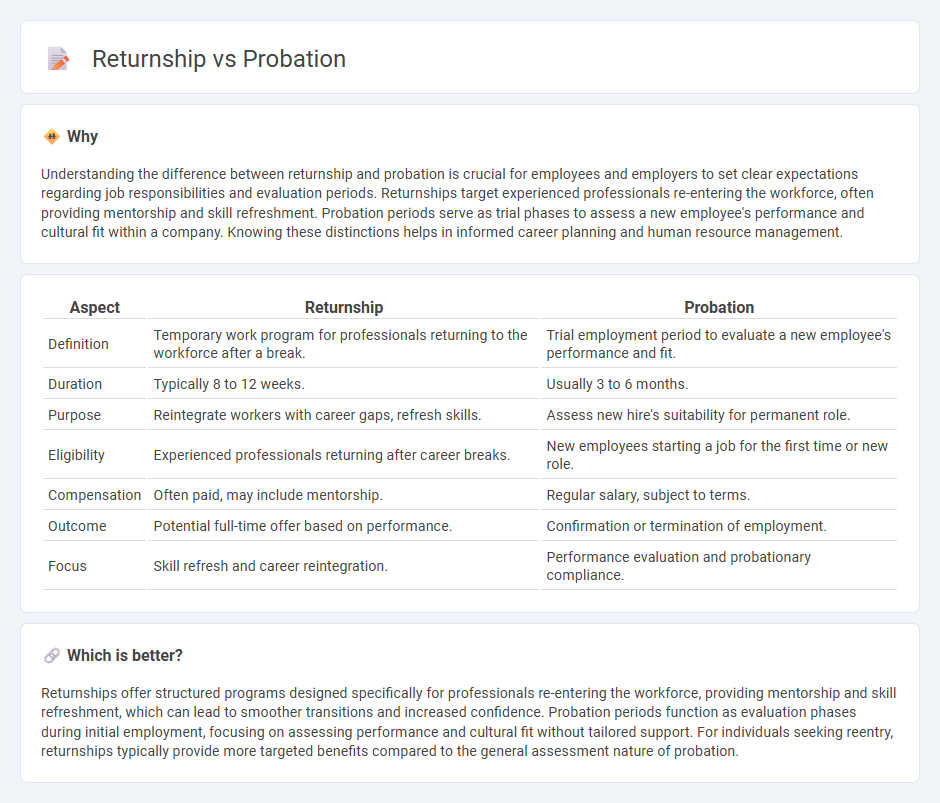
Returnships offer experienced professionals a structured pathway to re-enter the workforce with tailored training and support, often after career breaks. Probation periods serve as initial trial phases during regular employment to assess new hires' suitability and performance. Explore the key differences between returnship programs and probation to determine the best fit for your career development.
Why it is important
Understanding the difference between returnship and probation is crucial for employees and employers to set clear expectations regarding job responsibilities and evaluation periods. Returnships target experienced professionals re-entering the workforce, often providing mentorship and skill refreshment. Probation periods serve as trial phases to assess a new employee's performance and cultural fit within a company. Knowing these distinctions helps in informed career planning and human resource management.
Comparison Table
| Aspect | Returnship | Probation |
|---|---|---|
| Definition | Temporary work program for professionals returning to the workforce after a break. | Trial employment period to evaluate a new employee's performance and fit. |
| Duration | Typically 8 to 12 weeks. | Usually 3 to 6 months. |
| Purpose | Reintegrate workers with career gaps, refresh skills. | Assess new hire's suitability for permanent role. |
| Eligibility | Experienced professionals returning after career breaks. | New employees starting a job for the first time or new role. |
| Compensation | Often paid, may include mentorship. | Regular salary, subject to terms. |
| Outcome | Potential full-time offer based on performance. | Confirmation or termination of employment. |
| Focus | Skill refresh and career reintegration. | Performance evaluation and probationary compliance. |
Which is better?
Returnships offer structured programs designed specifically for professionals re-entering the workforce, providing mentorship and skill refreshment, which can lead to smoother transitions and increased confidence. Probation periods function as evaluation phases during initial employment, focusing on assessing performance and cultural fit without tailored support. For individuals seeking reentry, returnships typically provide more targeted benefits compared to the general assessment nature of probation.
Connection
Returnship programs serve as structured transitional opportunities for professionals re-entering the workforce after a career break, often incorporating a probation period to evaluate performance and cultural fit. The probationary phase within returnships allows employers to assess skills, adaptability, and commitment before confirming permanent employment. This connection ensures a mutual understanding of expectations, enhancing retention rates and facilitating successful reintegration into professional environments.
Key Terms
Evaluation Period
Probation periods serve as formal evaluation phases where new employees' performance and fit within a company are closely monitored, typically lasting three to six months. Returnships are structured programs designed for professionals re-entering the workforce, offering targeted project-based evaluation and skill refresher opportunities within a set timeframe. Explore the key differences between probation and returnship evaluations to better navigate career transitions and employer expectations.
Skill Refresh
Probation periods primarily evaluate an employee's ability to integrate and perform in a new role, while returnships emphasize skill refresh and professional development for individuals re-entering the workforce after a career break. Returnship programs offer structured training and mentorship to help update technical capabilities and industry knowledge, addressing gaps more effectively than traditional probation. Explore the distinctions and benefits to determine the best approach for talent reintegration and growth.
Permanent Placement Potential
Probation periods are commonly used by employers to evaluate new hires' performance and cultural fit before confirming permanent placement, usually lasting between 3 to 6 months. Returnships, designed primarily for professionals re-entering the workforce after a career break, offer structured training and mentorship with a strong emphasis on converting participants into full-time employees. Explore detailed comparisons and insights to understand how each pathway enhances permanent placement potential.
Source and External Links
Probation - Probation is a period of supervision over an offender ordered by the court, often as an alternative to incarceration, where the offender must follow specific conditions.
Probation - Los Angeles County - This webpage provides information on formal probation in Los Angeles County, including its supervision process and the terms and conditions offenders must adhere to.
The History of Probation - This webpage discusses the origins of probation, tracing back to English criminal law in the Middle Ages, and its development in the United States.
 dowidth.com
dowidth.com